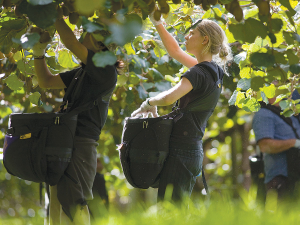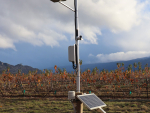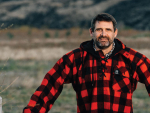A new report is calling on kiwifruit growers to ramp up capital planning discussions with the post-harvest segment (PHS) providers and banks.
In the report, The Time for Capital Planning is Nigh – Funding the Expansion of New Zealand’s Kiwifruit Post-Harvest Infrastructure, agribusiness banking specialist Rabobank says global demand for Zespri kiwifruit is forecast to rise to 300 million trays by 2028.
“To meet this anticipated jump in demand, the production of New Zealand-grown Zespri kiwifruit will need to increase to around 225 million trays over this period with the balance coming from Zespri’s global supply program grown under licence outside of New Zealand,” says report author, Rabobank senior horticultural analyst Hayden Higgins.
“This required lift in production of New Zealand-grown kiwifruit represents a 46% increase on 2019 volumes.
“While the industry is currently doing what it can to optimise existing infrastructure and expand production capacity, Zespri expects between $700 million and $750 million of capital expenditure will be required to handle 225 million trays of kiwifruit by 2028.”
Higgins believes both bank debt and shareholder equity will be required to fund this new infrastructure.
“Fundamental to supporting this expansion will be the capacity of the PHS to borrow from banks and – given the strong recent performance of the sector over recent seasons – the sector appears well placed to do so,” he explains.
“The PHS will also have to source equity, and our modelling suggests this will need to be more than one-third (approximately $250 million) of the forecast capital expenditure.”
Higgins says kiwifruit growers have a vested interest in investing in the supply chain and are therefore the most likely source of the new equity required.
“Ultimately, growers have three alternative paths they can take with regard to funding the new equity needed for PHS infrastructure,” he adds.
“Firstly, they could choose to directly invest and become shareholders of post-harvest operations and fund this from their own orchard operations. Secondly, they could choose not to invest but potentially pay an increased packing charge to support a dividend stream suitable to non-grower investors. And finally, they may end up with a combination of the two.”
Higgins says with these options in front of them, growers should be looking to engage with industry participants to plan for this future funding requirement.
“Communication of strategy between growers and the post-harvest segment will be essential and growers should be engaging with their PHS providers to understand their plans to participate in the infrastructure expansion, how they expect this will be funded and their options for participation.”
He adds that communication with financiers will also be essential.
“Banks will want to understand a grower’s strategy and if it includes expanding production and owning shares or even owning shares without expanding production.”











